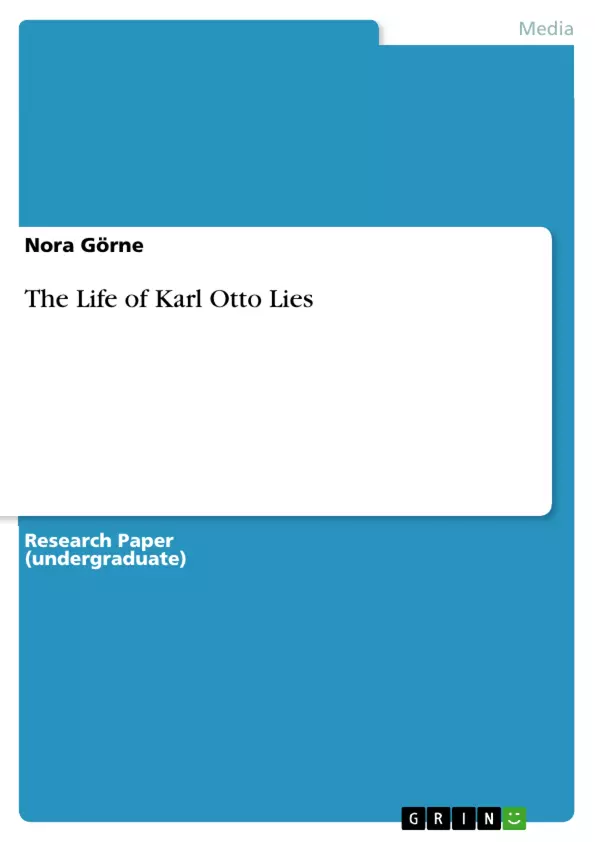That failure is not always caused by a lack of talent but rather a lack of fortune and false modesty can be seen exemplary in the life of the Dutch-German composer Karl [Carl] Otto Lies. He was born on 26 July 1869 in Hanover as the first of two children of the Roman Catholic bailiff Karl Lies and his wife Margaretha Louisa Brand. Already during his college years in Cologne, he started composing several piano and organ pieces. After college, he entered the conservatoire of Cologne and was taught composition and conducting by prof. Franz Wüllner, a well-known German composer and conductor (Dohr). Furthermore, he had classes in music theory with Gustav Jensen, piano with Otto Klauwell and score reading with conductor Eduard Mertke. In his leaving certificate, Franz Wüllner wrote about him: “He has proven to be highly ambitious and gifted and developed to a splendid musician during his study period.”1 This statement sounds especially comprehensible if one considers that Lies composed during his studies among others one cantata, various pieces for piano en two symphonies of which he performed parts in his final exam. Apart from that, one can unfortunately not learn much more about his study period because the historical city archive of Cologne which probably contained some material collapsed two years ago.
Inhaltsverzeichnis (Table of Contents)
- The Life of Karl Otto Lies
- His Study Period
- His Life in Goes
- His Meeting with Abraham Anthony Noske
- His Later Years
- His Music
Zielsetzung und Themenschwerpunkte (Objectives and Key Themes)
This biography explores the life and career of the Dutch-German composer Karl Otto Lies, highlighting his musical achievements and the factors that influenced his success. It provides a detailed account of his creative output, including his compositions, performances, and collaborations.
- The impact of circumstance on artistic success
- The interplay of talent and opportunity in a musical career
- The influence of social and political contexts on an artist's development
- The significance of mentorship and collaboration in the arts
- The challenges and rewards of pursuing a musical career in the late 19th and early 20th centuries
Zusammenfassung der Kapitel (Chapter Summaries)
- This chapter introduces Karl Otto Lies, outlining his early life, musical education, and early compositional works. It highlights his talent and ambition, as evidenced by his achievements during his studies.
- This chapter focuses on Lies' move to Goes, Netherlands, and his career as a conductor and composer. It details his involvement with the “Maatschappij tot Bevordering der Toonkunst” choir and the formation of the Goes Symphony Orchestra.
- This chapter describes Lies' encounter with Abraham Anthony Noske, his publisher and a significant figure in his career. It also discusses his foray into music criticism and his unsuccessful attempts to secure positions in Groningen and Alkmaar.
- This chapter examines the later years of Lies' life, focusing on his family, his continued involvement in music, and the reception of his works. It highlights the success of his extended ballad “Lenore” and the challenges he faced in balancing his artistic ambitions with personal and professional obligations.
Schlüsselwörter (Keywords)
This biography focuses on the life and career of Karl Otto Lies, a Dutch-German composer. The text explores his musical achievements, including his symphonies, cantatas, Lieder, and piano pieces. Key themes include the importance of talent and opportunity, the impact of social and political contexts on artistic development, and the role of mentorship and collaboration in the arts. The work examines Lies' experiences as a musician in the late 19th and early 20th centuries, highlighting the challenges and rewards of pursuing a musical career during that period.
Frequently Asked Questions
Who was Karl Otto Lies?
Karl Otto Lies (1869–1955) was a Dutch-German composer, conductor, and music critic, known for his symphonies, cantatas, and piano pieces.
Where did Karl Otto Lies receive his musical education?
He studied at the conservatoire of Cologne, where he was taught composition and conducting by the famous Professor Franz Wüllner.
Why is information about his study period limited?
Much of the historical material was likely lost when the historical city archive of Cologne collapsed in 2009.
What was his most successful musical work?
One of his most recognized and successful works was the extended ballad titled "Lenore".
What are the key themes of this biography?
The biography explores the impact of talent versus fortune, the role of mentorship, and the challenges of a musical career in the late 19th and early 20th centuries.
- Citation du texte
- Nora Görne (Auteur), 2011, The Life of Karl Otto Lies, Munich, GRIN Verlag, https://www.grin.com/document/177729



